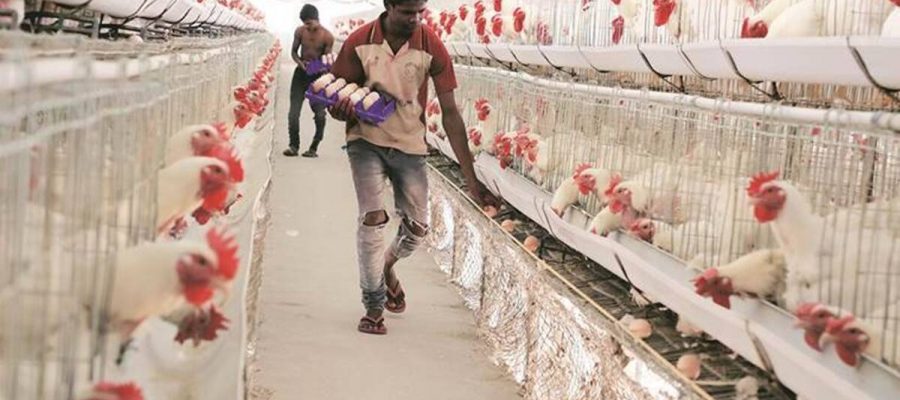Soyameal or soyameal cake, the solid substance left after oil is expelled from the seed, forms the 30 per cent protein component of poultry feed, with maize forming the carbohydrate component or 70 per cent of the feed.
As soyabean prices have touched a historic high, the poultry industry has pressed the distress button and asked for concrete steps to control the price rise, which they claim is mostly due to speculative trade. B Soundarajan, chairman of the Coimbatore-headquartered Suguna Food Private Limited, has sought immediate steps, including duty-free import of the oilseed, to help the industry survive.
Soyameal or soyameal cake, the solid substance left after oil is expelled from the seed, forms the 30 per cent protein component of poultry feed, with maize forming the carbohydrate component or 70 per cent of the feed.
Soundarajan, whose brand ‘places’ around 1.2-1.3 million-market-ready birds (weighing between 2-2.5 kg) per day in the country, said the poultry industry in India consumes 4-4.5 lakh tonnes of soyameal per month as feed.
Right from the start of the new oilseed marketing season (October- September 2020-21), concerns about prices had kept both solvent extractors and feed manufacturers on their toes. The Soyaben Oil Processors Association, the Indore-based association of solvent and extractors in the country, had estimated 96.71 lakh tonnes of soyabean would be available for crushing.
Concerns about quality and lower yield in Madhya Pradesh, the largest soyabean producer in the country, had kept the average traded price of the oilseed above the Minimum Support Price (MSP) of Rs 3,880 per quintal. At Latur’s wholesale market, one of the most important markets for oilseed, the average traded price is now Rs 6,990 per quintal, which traders confirm is a historic high.
With prices at an all-time high, the industry has reported an abnormal increase in the cost of production. “The present cost of production is now Rs 85 per kg as against the normal Rs 70-75 per kg a few weeks ago,” said Soundarajan.
Soundarajan and others in the industry have blamed speculators and stockists for the steep price hike in the oilseed. ”Stockists have procured the produce from farmers and are now holding on to the same, which has created a shortage in the markets,” he said. SOPA had estimated that 36.64 lakh tonnes of the oilseed was with stockists, traders and farmers as of March 1. This has to feed the markets till the arrival of the new crop later in the year.
The present condition, the industry says, is a classic case of speculative trade on the futures trading platform of the National Commodity and Derivatives Exchange. A similar claim was made by Davish Jain, chairman of SOPA, in a letter to the Securities and Exchange Board (SEBI) on October 12 last year, in which the body had asked for suspension of future trade of soyabean from the platform. Recently, the All India Poultry Breeders and Farmers Association has written to Prime Minister Narendra Modi with a similar plea.
In order to curb the prices, Soundarajan has also suggested duty-free import of soyabean to ease the constraints. However, non availability of non-genetically modified oilseed in the world market may make imports difficult.
Source: Read Full Article


